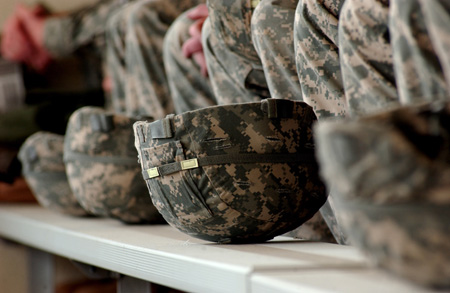
Photo courtesy of the U.S. Army
Ordinarily, when the U.S. is at war, there would be some discussion of that war in the presidential campaign.
In the 2012 election cycle, however, the public has been left largely in the dark when it comes to the candidates’ views on the war the U.S. is still fighting in Afghanistan, or the war the U.S. recently stopped fighting in Iraq.
But even if Afghanistan and Iraq are off limits on the campaign trail—along with much of the rest of the candidates’ foreign policies—a crucial domestic component to the issue of military intervention remains: the veterans.
There are about 2.4 million veterans of Afghanistan and Iraq, nearly a million of whom may still carry with them a heavy burden of war, in the form of wounds, diseases or chronic conditions.
How will the U.S. as a nation meet their needs? That’s the question raised by Juliette Kayyem, a lecturer at Harvard’s Kennedy School of Government and a Boston Globe columnist, after a recent stint as assistant secretary for intergovernmental affairs at the U.S. Department of Homeland Security.
Kayyem argues that the reintegration, employment, and mental and physical health of veterans are all significant challenges that the candidates should be addressing. But, in a recent column in the Globe, she wrote that contemporary political discourse has “left service members by the wayside.”
The column was prompted by the fact that Romney, during his speech at the Republican convention in Tampa, made no mention of veterans issues at all—and didn’t even thank the troops.
At the first presidential debate, there was no mention of veterans programs or the troops.
Kayyem said it’s too easy for the public to forget veterans, because they comprise such a small and often isolated segment of the population—“The other 1 percent, as they call themselves.”
For many of us, the recognition of veterans comes in Jumbotron moments, Kayyem said: Salutes at halftime, or at the top of the fifth inning.
But those moments pass quickly, and Kayyem worries that there is insufficient appreciation for the extent of damage veterans have suffered, particularly from the constant redeployments.
The official tally of the wounded in action in Iraq and Afghanistan is about 50,000, but that’s a very narrowly-defined category. Reputable studies suggest that about 1 in 3 veterans—or about 800,000—were damaged by the wars if you take into account all the men and women who returned with traumatic brain injuries, post-traumatic stress, depression, hearing loss, breathing disorders, diseases and other long-term health problems.
One key data point is missing. “We don’t know the suicide rate of veterans,” Kayyem said. The Department of Veterans Affairs estimated in 2010 that it was about 18 veterans a day. That’s 20 percent of all suicides in the United States, and at the current rates, 25 veterans for every soldier killed on the battlefield.
Candidates should also be asked: What about the next time the U.S. goes to war? Is the nation prepared to do this all over again?
Are the candidates prepared to once again commit to a multi-year war with an all-volunteer Army, limited resources, and activation of the National Guard? Are they willing to contemplate a draft? Will they limit themselves to the use of air power?
“Veterans are created because of wars and these veterans are unique because of the kinds of wars we’ve fought,” Kayyem said.
The first step, though, is publicly recognizing that veterans are the nation’s responsibility, and its problem, Kayyem said. “What’s hard is fixing the problem. Recognizing that it’s ours is not hard.”


